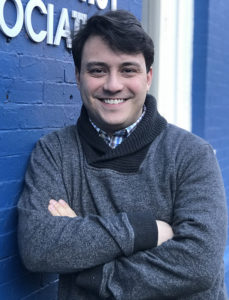Meet the New AHA Staff Member: Sam Gerard

Please welcome the American Humanist Association’s new Member Services Assistant, Sam Gerard!
TheHumanist.com: What is your educational and work background?
I majored in history and political science at the University of Alabama (Roll Tide). I have always been interested in history and the lessons we can learn from our past. The biggest lesson I learned in school was how to critically think and really dive into a subject (my only real discomfort came when studying war in depth). Outside of academics, my biggest claim-to-fame on campus was organizing a massive recycling initiative and increasing sustainability visibility. That led me to work as an organizer for the US Public Interest Research Group for a couple years in Ohio doing lobbying, advocacy, and constituent engagement, as well as working much more actively around environmental policy at the federal and state levels. I have also interned at the Center for Inquiry and in Senator Joe Manchin’s office here in DC.
TheHumanist.com: How did you first learn about humanism?

Sam Gerard
In 2012 I went to the Secular Student Alliance annual conference at the Ohio State University, which opened my eyes to the variations of nontheism and the kinds of activism that nontheists can engage in to improve the world—both in the secular community and beyond. Meeting humanist attendees and speaking with humanist speakers at the conference made me realize that this philosophy was the best way to identify my beliefs and to better the world we’re all a part of.
TheHumanist.com: Did you grow up in a traditional religious faith? How did it impact you?
I was lucky to grow up in a nonreligious household; however, I grew up nonreligious in Alabama, where the vast majority of individuals are evangelical Christians. Someone not being religious wasn’t a concept most were comfortable with. If I had a dollar for every invitation to church or “starter Bible” I was handed since fifth grade, I could buy really good tickets for a Billy Joel concert (like VIP, meet-him-after-the-show-and-he’ll-tell-you-untold-secrets-behind-his-songs kind of tickets).
Despite the privileges that come with being a white, cis, straight male in the state, I like to think my lack of faith helped me to better understand the wrongs that others faced and become more empathetic.
TheHumanist.com: What interested you most about working for the American Humanist Association?
We’re in a precarious time where faith is driving many policy decisions, and bigotry is re-entering the zeitgeist. Questioning political correctness, outwardly demonstrating hate toward disparaged communities, refusing asylum to refugees , and an increasingly divided political discourse sadly renews our call-to-arms to uphold social justice. At the core of this ongoing struggle, it is critical that advocates and defenders of science, justice, and diversity stand up for the egalitarian concept that our country was founded upon. I believe the American Humanist Association is one of those critical advocates and defenders to protect and maintain many of the victories we’ve seen so far and prevent scale backs.
TheHumanist.com: What book has influenced you the most?
T.H. White’s The Once and Future King probably provided the most influential framework to me. Throughout the book, Merlin guides Arthur (called “the Wart”) as they enter new experiences and take away new lessons from unlikely teachers during the Wart’s formidable years. And even once the Wart becomes King Arthur, Merlin is still guiding and teaching him to show him that there are places to learn and unlikely teachers all around you—and that you never stop learning.
TheHumanist.com: If you could have dinner with any three people in the world (living or dead), who would they be and why?
First, I’d invite Thomas Jefferson, who helped carve out the notion of separation of church and state. Jefferson’s reaction to the last fifty to sixty years of history would be incredible to hear, considering the amount of change and diversity the US has undergone over that time, and to see what fundamentals he envisioned that the US has held up and what we’ve strayed from.
Robert Bakker would also get an invite—I’d love to pick his brain about dinosaurs, paleontological expeditions he’s been on, and how he pieced together his theories about dinosaur evolution and extinction. Dinosaur Heresies, the book he’s most famous for, has been sitting on my bookshelf for as long as I can recall. Dinner and a free lecture about dinosaurs are a combination of two of my favorite things.
And finally, I’d want Jeff Goldblum to join us. I probably wouldn’t even talk to him but instead just watch him talk, laugh, sing, be nice to everyone at the restaurant, and wander over to the piano and play for forty-five minutes. Plus, I’ll seem cool by association.
